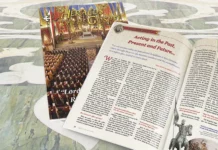In our daily life we seldom consider the importance of the word. However, it has the power to either contribute to the sanctification of souls or cause them grave harm…
Considered within the whole of creation, man is like a mysterious “treasure chest” in which God has deposited the most diverse and precious gifts. One of these, particularly special, is the word.
Perhaps in our daily life we seldom consider its importance, and we use it continually without much reflection. However, it can be transformed into a powerful instrument of edification, if well used, or into a dangerous weapon of destruction…
Indeed, countless souls have been converted to the paths of holiness by holy preaching or by reading the Word of God; and perhaps even more numerous are those who have persevered in virtue because of the wise counsel of a brother in the Faith. On the other hand, the misuse of this ability has dragged and still drags multitudes to perdition, and can have devastating effects on its victims, principally as a result of a well-known vice: slander.
“Who are you that you judge your neighbour?”
Slander essentially consists of the use of the faculty of expression to highlight and propagate something bad, existent or not, in another person, and it easily finds fertile ground in the human soul.
As no one is exempt from defects and shortcomings, it is natural that interaction, even among those who love each other very much, tends toward a certain gradual deterioration. And, often in an inadvertent manner, the brilliance of the qualities of others begins to diminish in the eyes of those around them, and the weaknesses begin to be noted.
This is when the danger presents itself. If one is not careful, soon the good sides of others are completely forgotten, and only their defective aspects are unjustly considered… And since, “out of the abundance of the heart the mouth speaks” (Mt 12:34), at this stage the tempter easily convinces one to publicize the defects which one has found, even if the impression is a mistaken one.
Be that as it may, no one has the right to make known the miseries of his neighbour. If God, the only true Judge and principal one offended by the faults of men, does not do it, who may dare to do so? To those who think themselves fit for this, the reproach of Scripture applies: who are you that you judge your neighbour? (cf. Jas 4:12).
Furthermore, whoever publishes the faults of others does harm to those who hear, both because of the scandal that these faults may cause, and because of the possible inducement to join in the same the vice of slander. Woe to those who cause scandal! It would be better for them to have a millstone tied around their necks and to be thrown into the sea (cf. Lk 17:1-2)!
We must also consider the teaching of the Divine Master: “Judge not, and you will not be judged; condemn not, and you will not be condemned; forgive, and you will be forgiven; give, and it will be given to you; good measure, pressed down, shaken together, running over, will be put into your lap. For the measure you give will be the measure you get back” (Lk 6:37-38).
Remedy for weak souls
Some people allow themselves to be contaminated by slander out of weakness. Overburdened by the shortcomings of others, they seek to “vent” their sorrows and resentments in inappropriate comments. To such souls, Catholic morality offers a superior and effective remedy: admiration.
In an atmosphere of admiration, the “weeds” of malicious gossip have no room to grow. It makes us similar to a hummingbird that, approaching the flowers, goes straight to the nectar and ignores the thistles: the admirer takes such pleasure in considering the qualities of others that he has no room left to consider the defects.
However, to achieve such nobility of soul, simple human efforts are not enough… It is necessary to join our hands and pray to God, through the intercession of Our Lady, for the superabundant help of grace. Thus comforted by the supernatural, we become capable not only of extolling the good sides of his companions, but also of being ready to remedy their weaknesses and to be a help to them in their struggle for virtue.
Finally, admiration is also the solution to sins of slander that have already been committed. Since Catholic doctrine demands that one should restore the honour of one’s neighbour who has been denigrated in the eyes of others, no means could be more effective than praising his qualities.
Chastisement for the obstinate
Along the road of the misuse of the tongue, however, there are also hardened souls, offspring of hatred, who become slanderers of those who do good and who, therefore, constitute an indictment of the turpitude of their own lives.
For the wicked throughout history, to attribute publicly and in bad faith unfounded offences to just souls has been one of the most effective means of persecution, because false testimonies always find a home in the superficiality and laxity of hearts… Few are the upright and courageous who take the trouble to analyse the facts in depth in order to draw an honest conclusion from them; the majority, on the contrary, listen with complacency, negligence and human respect to the criminal accusations, and do not oppose those who make them, becoming, according to St. Thomas Aquinas,1 partakers of the same sin.
This is what was the Redeemer suffered during His public life, until being finally condemned to the torment of the Cross for crimes that He had never committed. The Jewish people, who had obtained from Him all manner of miracles, cures and heavenly graces, instead of defending the evident innocence of the Divine Lamb, preferred to negligently yield to the hatred of the elders and teachers of the Law.
However, Providence, who is jealous of His elect, reserves for insatiably vindictive souls the punishment prophesied in the Book of Psalms: “O deceitful tongue […] God will break you down for ever; He will snatch and tear you from your tent; he will uproot you from the land of the living” (52:4-5). Let not the slanderer be established in the land; let evil hunt down the violent man speedily! (cf. Ps 140:11)!
Let us be faithful children of the Holy Church!
In his epistle, St. James sums up well the primordial importance of the gift of the word: “if any one makes no mistakes in what he says, he is a perfect man, able to bridle the whole body also. If we put bits into the mouths of horses that they may obey us, we guide their whole bodies. Look at the ships also; though they are so great and are driven by strong winds, they are guided by a very small rudder wherever the will of the pilot directs. So the tongue is a little member and boasts of great things” (3:2-5).
Therefore, let us learn to use with holiness this weapon that has been placed in our hands. Let us bridle our tongue and place it under the sweet yoke of admiration. In this way divine benevolence will accompany us!
Above all, as faithful children of Holy Church in these times of tribulation, let us be vigilant against the infernal voices that are raised against her and let us step forward with promptness and pride in her defence, convinced that she is always immaculate and indefectible, worthy of all praise! ◊
In the featured photo: Two women conversing, Sindelfingen (Germany)
Notes
1 Cf. ST. THOMAS AQUINAS. Summa Theologiæ II–II, q.73, a.4.







